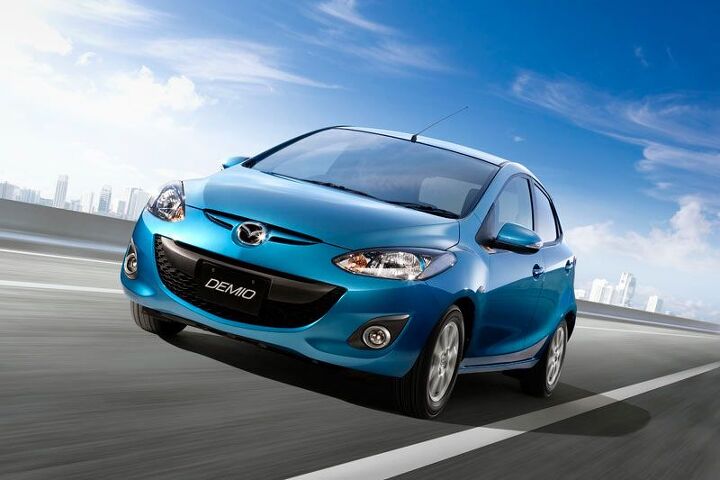Mazda Is Cooking With Gas, Hates The Strong Yen

In an interview with The Nikkei [sub], Mazda’s President Takashi Yamanouchi mounted a spirited defense of the internal combustion engine. He said it won’t go away anytime soon. He thinks the ICE will remain a mainstream option, especially in emerging markets. As proof he points to the recently launched Demio subcompact, which gets similar mileage as a Honda hybrid.
Yamanouchi does not believe that hybrids or EVs will make a huge dent into the market, especially not in the emerging markets, where money is tight.
“The size of the global auto market is now at roughly 60 million units, but it will top 100 million sooner or later. Though we factor in opinions from outside the industry, the share of hybrid and electric cars in the global market will probably not exceed 5% in 2020. That means gasoline-powered cars are expected to continue to dominate the market.”
“Demand for gasoline cars in rapidly growing emerging markets is expected to swell. As gasoline cars have a bigger share of the market, improvements to fuel-efficiency technologies can help to slow down the pace of global warming. By 2015, we will raise our average mileage by 30% from 2008.”
All electric cars will have an even tougher time in Yamanouchi’s eyes:
“The key environmental technology (in the development of electric cars) is weight reduction. Electric and hybrid cars are heavier than gasoline cars because they are loaded with batteries and motors. The advantage of running the car in a motor-assisted mode is not necessarily big if it is on expressways.
As mileage rates are shown in figures, they are easy to compare. But cars also hold the kind of appeal that cannot be translated into numbers. It is more fun to drive gasoline cars than electric cars, because gasoline cars can offer the feel of a real engine. And it will become difficult to make a difference in motors alone. As we switch to new models, we will reduce the weight of our cars by 100 kg.”
Now the Nikkei is throwing Yamanouchi a curve ball by quoting a number that is not true – yet: “The dollar is trading around the 70-yen level. Can you maintain domestic production under these circumstances?” The Yen trades at 77 to the dollar today. Yamanouchi throws the ball right back:
“The exchange rate of roughly 70 yen means that we cannot produce in Japan. It is beyond our strength. While working to slash costs, we must develop value-added products that can sell, even at higher prices. It is important to develop products that come with sophisticated technologies and designs and build up our brand recognition by improving marketing and services.
We have told our autopart suppliers that we will maintain domestic production of 1 million units. But Mazda alone has a limit when it comes to bearing the burden of the strong yen. We want them to shoulder the appropriate costs by settling transactions in dollars, among other means. We must work hand in hand to get through this common challenge and enhance our global competitiveness.”
Now there’s an idea: Japanese parts suppliers will sell parts to Japanese automakers and get paid in dollars. Not going to happen. The exchange rate poses a more pressing problem than whether we will change from ICE to hybrid or EV.

Bertel Schmitt comes back to journalism after taking a 35 year break in advertising and marketing. He ran and owned advertising agencies in Duesseldorf, Germany, and New York City. Volkswagen A.G. was Bertel's most important corporate account. Schmitt's advertising and marketing career touched many corners of the industry with a special focus on automotive products and services. Since 2004, he lives in Japan and China with his wife <a href="http://www.tomokoandbertel.com"> Tomoko </a>. Bertel Schmitt is a founding board member of the <a href="http://www.offshoresuperseries.com"> Offshore Super Series </a>, an American offshore powerboat racing organization. He is co-owner of the racing team Typhoon.
More by Bertel Schmitt
Latest Car Reviews
Read moreLatest Product Reviews
Read moreRecent Comments
- Ltcmgm78 Just what we need to do: add more EVs that require a charging station! We own a Volt. We charge at home. We bought the Volt off-lease. We're retired and can do all our daily errands without burning any gasoline. For us this works, but we no longer have a work commute.
- Michael S6 Given the choice between the Hornet R/T and the Alfa, I'd pick an Uber.
- Michael S6 Nissan seems to be doing well at the low end of the market with their small cars and cuv. Competitiveness evaporates as you move up to larger size cars and suvs.
- Cprescott As long as they infest their products with CVT's, there is no reason to buy their products. Nissan's execution of CVT's is lackluster on a good day - not dependable and bad in experience of use. The brand has become like Mitsubishi - will sell to anyone with a pulse to get financed.
- Lorenzo I'd like to believe, I want to believe, having had good FoMoCo vehicles - my aunt's old 1956 Fairlane, 1963 Falcon, 1968 Montego - but if Jim Farley is saying it, I can't believe it. It's been said that he goes with whatever the last person he talked to suggested. That's not the kind of guy you want running a $180 billion dollar company.


































Comments
Join the conversation